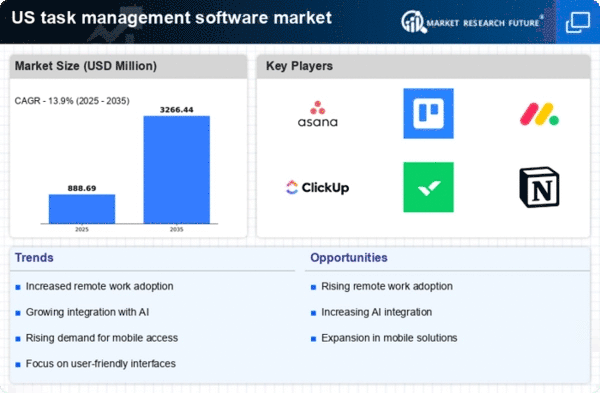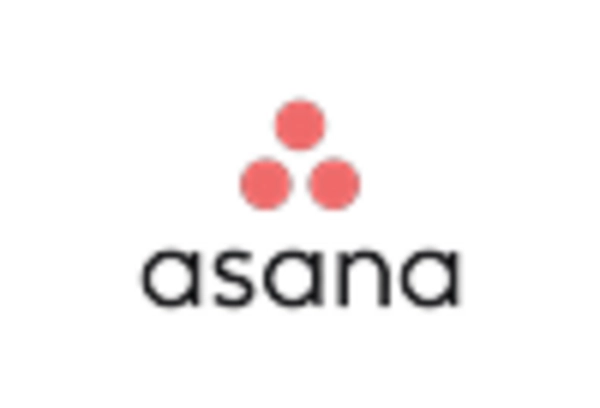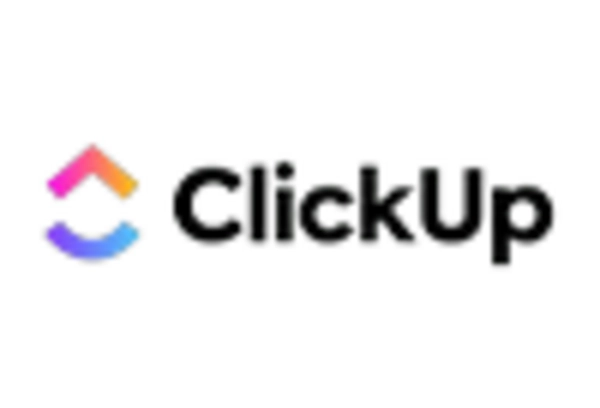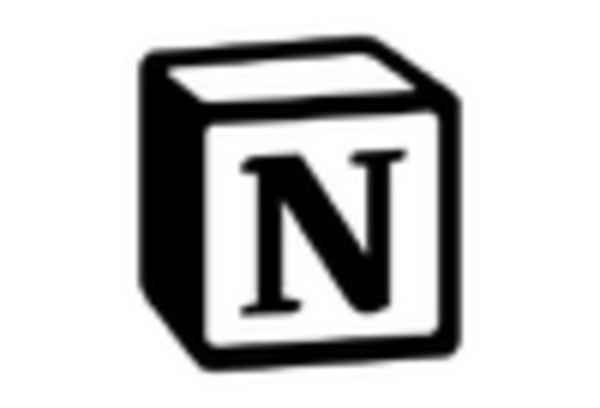Emphasis on Customization and Scalability
Customization and scalability are becoming pivotal drivers in the task management-software market. As businesses of varying sizes seek tailored solutions, the demand for software that can adapt to specific organizational needs is on the rise. In 2025, around 55% of US companies express a preference for task management software that offers customizable features and scalable options. This trend highlights the importance of flexibility in software design, allowing organizations to modify workflows and functionalities as they grow. Consequently, software providers are increasingly focusing on developing modular solutions that cater to diverse business requirements. This emphasis on customization and scalability suggests that the task management-software market will continue to evolve, accommodating the unique needs of different industries and fostering long-term user engagement.
Growing Need for Enhanced Project Visibility
the task management-software market experiences an increasing need for enhanced project visibility. Organizations recognize that clear visibility into project progress and resource allocation is essential for effective decision-making. In 2025, approximately 65% of project managers in the US report that they rely on task management software to gain insights into project timelines and team performance. This demand for transparency encourages software developers to incorporate advanced analytics and reporting features into their platforms. By providing real-time updates and visual dashboards, task management software enables teams to identify bottlenecks and optimize workflows. This trend suggests that the task management-software market will continue to expand as businesses seek tools that offer comprehensive project visibility and facilitate informed decision-making.
Rising Demand for Remote Collaboration Tools
The task management-software market experiences a notable surge in demand for remote collaboration tools. As organizations increasingly adopt flexible work arrangements, the need for software that facilitates seamless communication and project tracking becomes paramount. In 2025, approximately 70% of companies in the US report utilizing task management software to enhance team collaboration. This trend indicates a shift towards digital solutions that support remote work, driving innovation within the task management-software market. Companies are seeking platforms that not only manage tasks but also integrate features like video conferencing and real-time document sharing. This growing emphasis on collaboration tools suggests that the task management-software market will continue to evolve, catering to the needs of distributed teams and enhancing overall productivity.
Increased Focus on Data Security and Compliance
Data security and compliance have emerged as critical drivers in the task management-software market. With the rise of cyber threats and stringent regulations, organizations prioritize software that ensures data protection and adheres to compliance standards. In 2025, around 60% of US businesses indicate that security features significantly influence their choice of task management software. This heightened focus on security not only protects sensitive information but also fosters trust among users. As a result, software providers are investing in advanced security measures, such as encryption and multi-factor authentication, to meet these demands. Consequently, the task management-software market is likely to witness a shift towards solutions that prioritize robust security protocols, thereby enhancing user confidence and market growth.
Integration of Artificial Intelligence Capabilities
The integration of artificial intelligence (AI) capabilities represents a transformative driver in the task management-software market. AI technologies enhance task automation, predictive analytics, and personalized user experiences. In 2025, it is estimated that 40% of task management software solutions in the US incorporate AI features, allowing for smarter task prioritization and resource allocation. This integration not only streamlines workflows but also empowers teams to focus on high-value activities. As organizations increasingly recognize the potential of AI to improve efficiency, the task management-software market is likely to see a proliferation of AI-driven solutions. This trend indicates a shift towards more intelligent software that adapts to user behavior and optimizes task management processes.
















